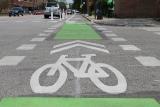City leaders from six U.S. cities will convene today in Austin, Texas to kick off an unprecedented two-day leadership summit to discuss green lanes and equity. The focus of the summit is on building support for modern, next-generation green lanes, also called protected bike lanes or cycletracks, and related street safety improvements in low-income neighborhoods and communities of color.
 The summit has assembled transportation professionals, policymakers and community leaders from Austin, Chicago (55th St. bike lane picture at right, courtesy University of Chicago), Memphis, Portland, San Francisco and Washington, DC, who are working to transform their cities streets to provide balanced, equitable urban mobility. The city leaders will share experiences and lessons learned to work toward a deeper understanding of the issues, identify best practices and brainstorm on next steps.
The summit has assembled transportation professionals, policymakers and community leaders from Austin, Chicago (55th St. bike lane picture at right, courtesy University of Chicago), Memphis, Portland, San Francisco and Washington, DC, who are working to transform their cities streets to provide balanced, equitable urban mobility. The city leaders will share experiences and lessons learned to work toward a deeper understanding of the issues, identify best practices and brainstorm on next steps.The issues surrounding equity in bicycle transportation are complex, ranging from the current wave of gentrification in cities to cultural barriers for bicycling in African-American and Hispanic communities. While the Summit does not aim to solve these complex and often emotional issues, it plans to initiate a robust conversation, improve collective understanding, and identify effective approaches.
Hosting this leadership summit is the Green Lane Project, a program associated with the citizen movement PeopleForBikes to catalyze the creation of world-class bicycling facilities in the U.S. and build national momentum for green lanes. Green lanes are dedicated, inviting spaces for people on bikes in the roadway, protected from cars and separated from sidewalks.
Changes to streets that invite more human-scaled interaction and encourage physical activity as part of daily life offer well-documented health, safety and economic benefits, said Martha Roskowski, director of the Green Lane Project. Despite the many studies that show these benefits, some proposals to install better bike lanes in low-income neighborhoods and historically underserved communities have met resistance. Our goal this week is to facilitate the conversation, addressing concerns specific to these communities, and highlight the many reasons all Americans should have access to safe bicycling.
The Austin Bike Lanes and Equity gathering is part of a series of best
practices workshops hosted by the Green Lane Project and held in the most advanced bicycling cities in the United States and Europe. For more information about the Green Lane Project, visit www.greenlaneproject.org.












